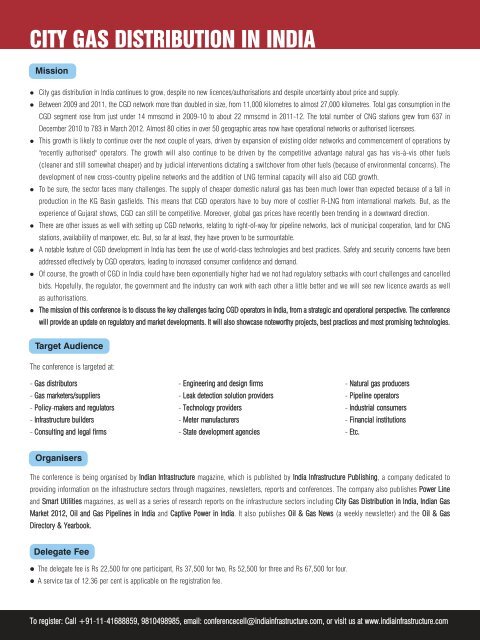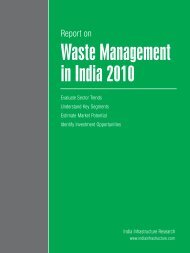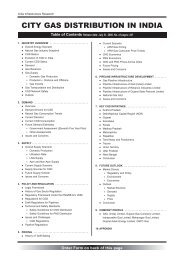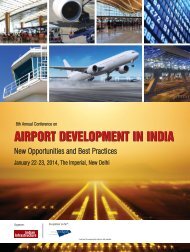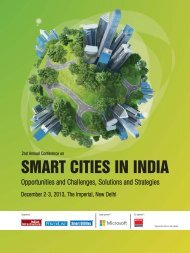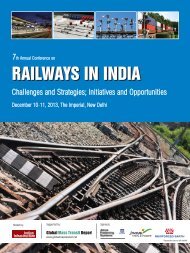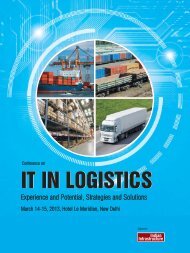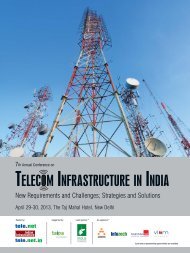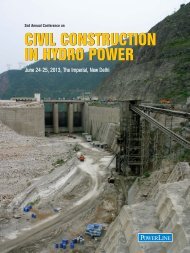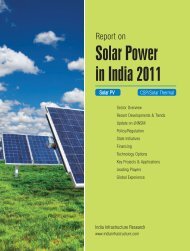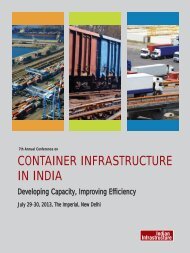<strong>CITY</strong> <strong>GAS</strong> <strong>DISTRIBUTION</strong> <strong>IN</strong> <strong>IN</strong>DIAMission• City gas distribution in India continues to grow, despite no new licences/authorisations and despite uncertainty about price and supply.• Between 2009 and 2011, the CGD network more than doubled in size, from 11,000 kilometres to almost 27,000 kilometres. Total gas consumption in theCGD segment rose from just under 14 mmscmd in 2009-10 to about 22 mmscmd in 2011-12. The total number of CNG stations grew from 637 inDecember 2010 to 783 in March 2012. Almost 80 cities in over 50 geographic areas now have operational networks or authorised licensees.• This growth is likely to continue over the next couple of years, driven by expansion of existing older networks and commencement of operations by"recently authorised" operators. The growth will also continue to be driven by the competitive advantage natural gas has vis-à-vis other fuels(cleaner and still somewhat cheaper) and by judicial interventions dictating a switchover from other fuels (because of environmental concerns). Thedevelopment of new cross-country pipeline networks and the addition of LNG terminal capacity will also aid CGD growth.• To be sure, the sector faces many challenges. The supply of cheaper domestic natural gas has been much lower than expected because of a fall inproduction in the KG Basin gasfields. This means that CGD operators have to buy more of costlier R-LNG from international markets. But, as theexperience of Gujarat shows, CGD can still be competitive. Moreover, global gas prices have recently been trending in a downward direction.• There are other issues as well with setting up CGD networks, relating to right-of-way for pipeline networks, lack of municipal cooperation, land for CNGstations, availability of manpower, etc. But, so far at least, they have proven to be surmountable.• A notable feature of CGD development in India has been the use of world-class technologies and best practices. Safety and security concerns have beenaddressed effectively by CGD operators, leading to increased consumer confidence and demand.• Of course, the growth of CGD in India could have been exponentially higher had we not had regulatory setbacks with court challenges and cancelledbids. Hopefully, the regulator, the government and the industry can work with each other a little better and we will see new licence awards as wellas authorisations.• The mission of this conference is to discuss the key challenges facing CGD operators in India, from a strategic and operational perspective. The conferencewill provide an update on regulatory and market developments. It will also showcase noteworthy projects, best practices and most promising technologies.Target AudienceThe conference is targeted at:- Gas distributors - Engineering and design firms - Natural gas producers- Gas marketers/suppliers - Leak detection solution providers - Pipeline operators- Policy-makers and regulators - Technology providers - Industrial consumers- Infrastructure builders - Meter manufacturers - Financial institutions- Consulting and legal firms - State development agencies - Etc.OrganisersThe conference is being organised by Indian Infrastructure magazine, which is published by India Infrastructure Publishing, a company dedicated toproviding information on the infrastructure sectors through magazines, newsletters, reports and conferences. The company also publishes Power Lineand Smart Utilities magazines, as well as a series of research reports on the infrastructure sectors including City Gas Distribution in India, Indian GasMarket 2012, Oil and Gas Pipelines in India and Captive Power in India. It also publishes Oil & Gas News (a weekly newsletter) and the Oil & GasDirectory & Yearbook.Delegate Fee• The delegate fee is Rs 22,500 for one participant, Rs 37,500 for two, Rs 52,500 for three and Rs 67,500 for four.• A service tax of 12.36 per cent is applicable on the registration fee.To register: Call +91-11-41688859, 9810498985, email: conferencecell@indiainfrastructure.com, or visit us at www.indiainfrastructure.com
March 6-7, 2013, The Imperial, New DelhiAGENDA/STRUCTUREKEY TRENDS AND OUTLOOK What have been the key developments in the past year? What are the key trends with respect to demand, supply, prices, etc.? What are the key opportunities and challenges?USE, APPLIANCES AND APPLICATIONS What are the trends in the development of gas-based household appliances? What is the usage potential in "local" power generation (gas engines, microturbines)? What steps are being taken by CGD operators to encourage gas consumption?OPERATOR VIEWPO<strong>IN</strong>T What are the plans of leading CGD operators? What do they see as key business challenges? How are they being addressed? What is their future outlook (issues, opportunities)?PROJECT SHOWCASE Which are the noteworthy projects (operational and upcoming CGD networks)? What are their key features (network size, design, milestones, targets, etc.)? What can we learn from the experience of these projects?REGULATORY PERSPECTIVE What has been the regulatory experience in CGD? What are the key issues? What is the status of the licence process? What are the key focus areas of the PNGRB for the next two-three years?NEW TECHNOLOGIES: STORAGE AND COMPRESSION What are the most promising technologies and solutions in storage and compression? What has been the experience with these technologies? What are the prospects for these technologies in India?UPDATE ON PIPEL<strong>IN</strong>E <strong>IN</strong>FRASTRUCTURE What is the current status of pipeline infrastructure? What is the update on projects under construction? Which are the projects being planned or bid out?ASSET <strong>IN</strong>TEGRITY AND MANAGEMENT What are the key challenges relating to asset integrity and management in CGD? What are the global best practices in this area? What has been the experience so far in India?<strong>GAS</strong> SUPPLY OUTLOOK What is the current status of gas supply (domestic production, R-LNG, etc.)? What is the outlook for the coming years? What are the various sourcing options for CGD operators?LEAK DETECTION AND METER<strong>IN</strong>G What are the key issues and challenges relating to leak detection and metering? What are the most promising and relevant technologies and solutions? What has been the experience so far in India?ECONOMICS AND F<strong>IN</strong>ANC<strong>IN</strong>G OF CGD PROJECTS What is the economics of CGD projects (capex/opex, PNG/CNG)? What are the typical financing structures? What are the risks and returns?FOCUS ON ENG<strong>IN</strong>EER<strong>IN</strong>G, DESIGN AND CONSTRUCTION What are the key trends in engineering and design of CGD networks? What are the best methods for pipeline construction in urban areas? What are the key challenges in CGD project management in India?Each session will have two parts. The first part will feature presentations by speakers. The second part will be devoted to Q&A and floor discussions. The conference willfeature the points-of-view of all key stakeholders – existing distributors, potential new players, gas producers/marketers, policymakers, financiers and investors, technologyproviders and infrastructure builders.Previous participantsThe organisations that have participated in our previous conferences include Acme, Adani, Advance Infrastructures, Agi-Glaspac, Al-aziz Plastic, Allard Partner, Amira Foods, APGIC, ArioInfrastructure, Arkema Peroxides, Asahi Glass, AT Kearney, Avantha Power & Infra, Avineon, Bhagyanagar Gas, Bhotika Pipeline, BNP Paribas, Borouge, BPCL, Burckhardt Compression,Cairn Energy, Caterpillar Commercial, Central UP Gas, Chevron, Chemtrols, Chicago Pnuematics, Clarke Energy, Control Plus, CPL Energy India, CRISIL, Cryogas Equipment, DanielMeasurement Solutions, Directorate General of Hydrocarbons, Dolat Capital, Eastern Gas, East India Petroleum, EIL, E&Y, Elster-Instromet, Emerson, Enam, Encare Earth Solutions,Engineers India, ESAB, Essar Oil, Evonik, ExxonMobil, Feedback Ventures, Ferranti, Fujitsu, GAIL, GDF Suez Energy, Genus Power Infrastructures, GE Sensing, Glynwed, GLNobleDenton, GMR Energy, GMMCO, Green Gas, GSPC, Gujarat Glass, Gujarat Gas, HCC, Haryana City Gas Distribution, Honeywell, HPCL, ICICI Bank, ICPCI, ICRA, IDBI, IDFC, Imkemex,Indraprastha Gas, <strong>IN</strong>EL Gas Controls, Intertek, IOCL, Ispat Energy, Itron, Jain Irrigation, Jubilant Energy, Katlax, Kawasaki, Kimplas Piping, Kirloskar Oil Engines, Kirloskar Pneumatics,Kotak Mahindra, KPMG, KSIDC, Lanco, Lanco Infratech, Logicon Engineering, Mahanagar Gas, Maharashtra Seamless, Makwana Engineering, MIDC, Ministry of Petroleum and NaturalGas, MNGL, Mott Macdonald, Mueller, Nandini Impex, NCC, Nirmal Industries, NTPC, Oil India, ONGC, Oracle, PDIL, Petro IT, Pinnacle Engines India, PNGRB, PPAC, PratibhaIndustries, PTT, Quippo Energy, Rai Industrial Power, Raychem RPG, Reliance Industries, Reliance Natural Resources, RMG Autometers, RMSI, Rockwin Flowmeters, Rohan Builders,Rolls Royce, RPG Raychem, Sabarmati Gas, Sandvik Asia, SAP, Saumya DSM, SBI Capital, Shell, Simon Carves, Siti Energy, Spice Energy, Supreme Industries, Surya Roshni, SwanEnviromental, Tata Power, TDW India, Technip KT, TERI, TGE Engineering, TIL, TNGCL, Trimble Navigation, UTI AMC, Vargo Petro-Tech, Varicon Pumps, Velosi Certification Services,Vitkovice India Power, Warburg Pincus, Welspun Infratech, Wartsila, Wipro, etc.To register: Call +91-11-41688859, 9810498985, email: conferencecell@indiainfrastructure.com, or visit us at www.indiainfrastructure.com


